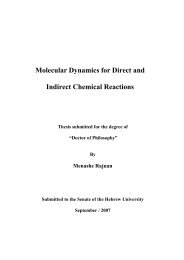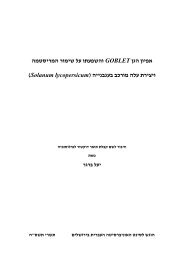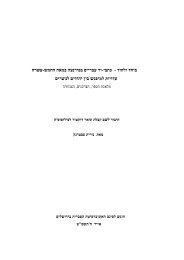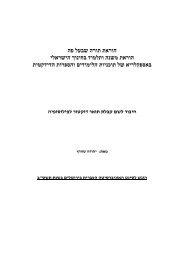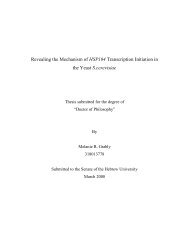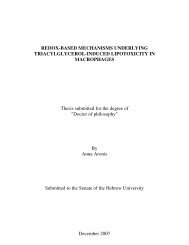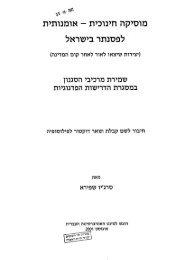××ר×ת ס×פ×ר ×× ×¡ ××קר×× ×××× ×× ××××××ª× ××שר×× - ×××× ××רס××× ××¢×ר×ת ...
××ר×ת ס×פ×ר ×× ×¡ ××קר×× ×××× ×× ××××××ª× ××שר×× - ×××× ××רס××× ××¢×ר×ת ...
××ר×ת ס×פ×ר ×× ×¡ ××קר×× ×××× ×× ××××××ª× ××שר×× - ×××× ××רס××× ××¢×ר×ת ...
Create successful ePaper yourself
Turn your PDF publications into a flip-book with our unique Google optimized e-Paper software.
מי שמקנה את המשמעות הזאת לטקסט הוא המחבר, ואי אפשר לנתקה ממנו:<br />
To banish the original author as the determiner of meaning was to reject<br />
the only compelling normative principle that could lend validity to an<br />
interpretation (ibid, p. 5). 15<br />
כל טקסט זקוק לפרשנות ,<br />
או של המחבר,<br />
או של הפרשנים,<br />
וכאשר הפך המחבר ל'בלתי-<br />
רלוונטי'<br />
16<br />
אליבא דתורות הרמנויטיות חדשות<br />
הפרשן הפך ל'מחבר'<br />
של המשמעות.<br />
אך איזו<br />
עדיפות יש לפרשן על פני המחבר בקביעת משמעות הטקסט (שם, עמ' 5-4)?<br />
תוצאת גישה זו<br />
היא שהמשמעות הופכת לחומר ביד היוצר, כאשר כל קורא קובע לעצמו מה הטקסט מתכוון<br />
לומר.<br />
תוצאה זו שוללת את אחת מאבני היסוד של טקסט,<br />
לדעת הירש,<br />
והיא ה sharable<br />
,self-identity<br />
של היצירה.<br />
היצירה חייבת להיות בעלת<br />
גבולות,<br />
ומהות פנימית;<br />
meaning<br />
.(44<br />
בלעדיהם, אין מהמהמהמה לפרש, ואין מצע משותף לפרשנות (1967,<br />
עמ'<br />
,1976<br />
ניתן להצדיק את<br />
'כוונת המחבר'<br />
ככלי הרמנויטי עיקרי גם מטעמים אתיים<br />
(הירש,<br />
עמ' 7):<br />
… authorial intention is not the only possible norm for interpretation,<br />
though it is the only practical norm for a cognitive discipline of<br />
interpretation. The choice of an interpretive norm … belongs to the<br />
domain of ethics rather than the domain of ontology (italics added).<br />
כאשר מפרשים טקסט ומתעלמים מכוונת המחבר,<br />
הטקסט מספק את הצרכים והמטרות של<br />
הפרשן. זה דומה לשימוש בבן אדם אחר לצרכים אישיים:<br />
Kant held it to be a foundation of moral action that men should be<br />
conceived as ends in themselves, and not as instruments of other men.<br />
This imperative is transferable to the words of men because speech is an<br />
extension and expression of men in the social domain, and also because<br />
when we fail to conjoin a man`s intentions to his words we lose the soul<br />
;154<br />
גם ליאו שטראוס טוען שכוונת המחבר קובעת במידה גדולה את משמעות הטקסט. ראה: שטראוס, 1952,<br />
לוז, עמ'<br />
ואחרים עמ'<br />
הירש מציין את<br />
עמ'<br />
.(2-1<br />
,1967)<br />
.269<br />
Eliot, Pound, Heidegger<br />
,2005<br />
15<br />
16<br />
90



